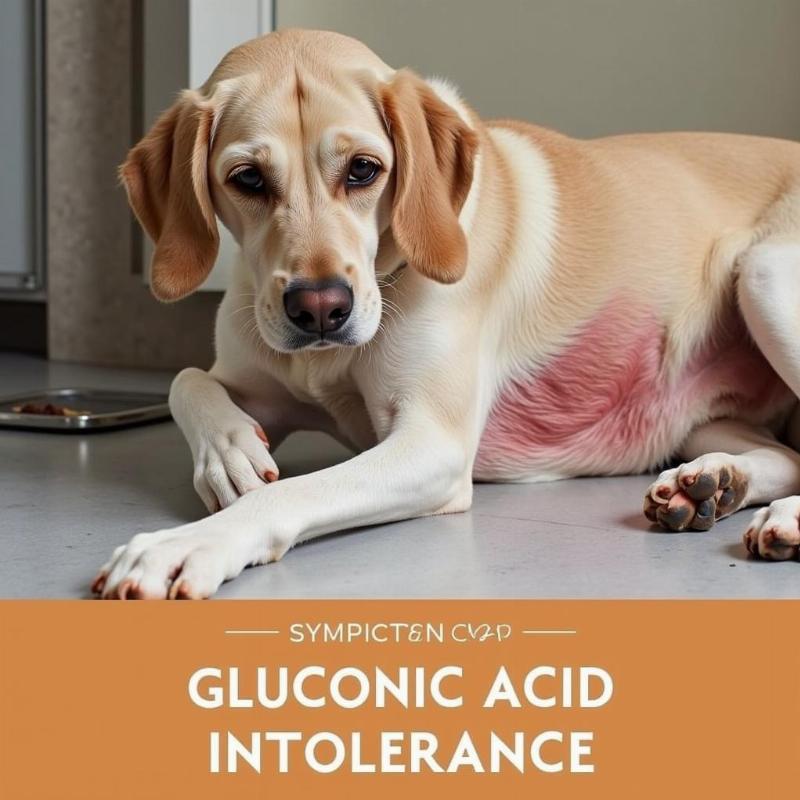Gluconic acid is often found in dog treats and supplements, raising the question: is gluconic acid safe for dogs? Understanding the role and potential effects of this ingredient is crucial for responsible pet ownership. This article dives into the science behind gluconic acid, its uses in pet products, and potential risks to help you make informed decisions about your dog’s diet.
Understanding Gluconic Acid in Dog Products
Gluconic acid is a naturally occurring organic acid derived from glucose oxidation. It’s commonly used as a chelating agent, meaning it binds to minerals like calcium, making them more readily absorbed by the body. In dog treats, it can also act as a preservative and flavor enhancer. While generally recognized as safe by the FDA, understanding its potential effects on dogs is essential.
Potential Benefits and Risks of Gluconic Acid for Dogs
For most dogs, gluconic acid in small amounts poses minimal risk. It can even be beneficial in enhancing mineral absorption, which is particularly important for growing puppies and senior dogs. However, excessive consumption can lead to digestive upset, including diarrhea and vomiting. Some dogs may also exhibit allergic reactions, such as itching and skin irritation. It’s crucial to monitor your dog for any adverse reactions after consuming products containing gluconic acid.  Dog with digestive upset
Dog with digestive upset
How to Choose Safe Treats Containing Gluconic Acid
When choosing treats for your furry friend, always check the ingredient list. Gluconic acid should be listed towards the end, indicating a lower concentration. Opt for treats made with high-quality ingredients and avoid those with excessive artificial colors, flavors, and preservatives. gluconic acid safe for dogs Consulting your veterinarian before introducing new treats, especially if your dog has pre-existing health conditions, is always recommended.
Is Gluconic Acid Safe for Puppies?
While generally safe in moderate amounts, puppies have more sensitive digestive systems. Therefore, it’s best to limit their intake of treats containing gluconic acid. Focus on providing them with a balanced diet formulated specifically for their developmental needs.
Can Gluconic Acid Cause Allergies in Dogs?
While rare, some dogs may develop allergies to gluconic acid. Symptoms include itching, skin redness, and gastrointestinal issues. If you notice any of these signs, discontinue the use of the product and consult your veterinarian.
What are the Signs of Gluconic Acid Intolerance in Dogs?
The primary signs of gluconic acid intolerance are vomiting and diarrhea. If your dog experiences these symptoms after consuming treats containing gluconic acid, it’s best to avoid giving them these treats in the future.
Are There Alternatives to Gluconic Acid in Dog Treats?
Yes, there are several alternatives to gluconic acid used as chelating agents and preservatives in dog treats, such as citric acid and ascorbic acid (vitamin C).
How Much Gluconic Acid is Too Much for a Dog?
There isn’t a specific amount deemed “too much,” as each dog’s tolerance varies. It’s essential to monitor your dog’s reaction to treats containing gluconic acid and consult your veterinarian if you have any concerns.
Conclusion
Gluconic acid in dog treats, when used in moderation, is generally considered safe. However, excessive consumption may lead to digestive upset or allergic reactions in some dogs. Always prioritize a balanced diet and consult with your veterinarian before introducing new treats or supplements to your dog’s diet. Careful selection and moderation are key to ensuring your furry friend enjoys treats safely.
FAQ
- What is gluconic acid used for in dog treats? It acts as a chelating agent, preservative, and flavor enhancer.
- Can gluconic acid be harmful to dogs? Excessive amounts can cause digestive issues or allergies.
- Should I avoid treats with gluconic acid? Not necessarily, but moderation and monitoring are key.
- Are there alternative ingredients to gluconic acid? Yes, citric acid and ascorbic acid are common alternatives.
- What should I do if my dog has a reaction to gluconic acid? Discontinue use and consult your veterinarian.
- Is gluconic acid safe for all dog breeds? While generally safe, some breeds may be more sensitive.
- How can I choose safe treats for my dog? Check the ingredient list, opt for high-quality ingredients, and consult your veterinarian.
treats for dogs with sensitive stomach
Beautdogs.us is your trusted source for comprehensive dog care information, breed expertise, and top-quality product recommendations. Catering to both new and experienced dog owners, we offer valuable insights into all aspects of canine companionship. From nutrition and training to health and wellness, Beautdogs.us empowers you to provide the best possible care for your beloved pet. Contact us at [email protected] or +1 501-555-7529 for personalized guidance. Visit Beautdogs.us today for expert advice and resources to enhance your dog’s life.